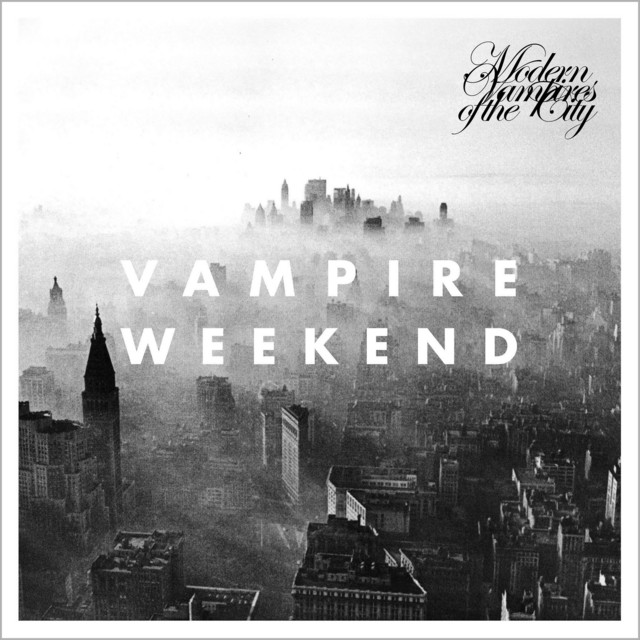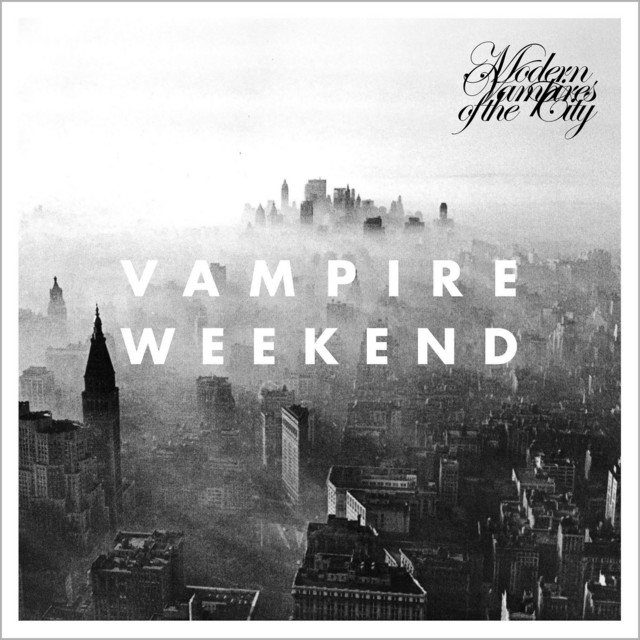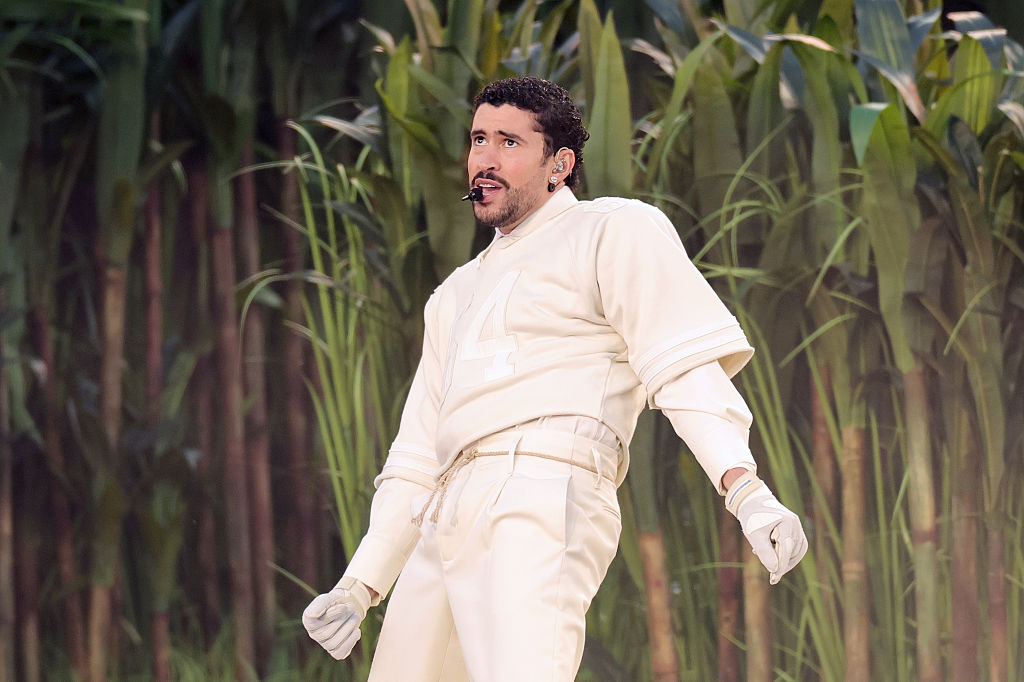- XL
- 2013
"It's amazing how quickly generations come and go," Ezra Koenig said. "And how quickly you go from one place to a new place."
Koenig was talking to SPIN for a feature titled "Vampire Weekend Are 2013's Band Of The Year" — among the last of the umpteen interviews the band gave while promoting their third album. Journalists have always flocked to Koenig and his bandmates; they were objects of fascination, adulation, and disdain from the beginning. But the press had especially good reason to fixate on Vampire Weekend a decade ago. After proving their mettle with two precocious, star-making LPs, the polarizing quartet had now capped off the first phase of their career with one of the defining creative statements of its era. The headline did not lie.
Modern Vampires Of The City came out 10 years ago this Sunday, and it's hard to think of an album that has meant more to me in the interim. I was only a casual Vampire Weekend fan before 2013, a person who enjoyed reading about them at least as much as listening to them. Yet Modern Vampires revealed itself as a masterpiece on my earliest listens, cruising a rental car down the Gulf shore to and from a music festival on the beach. That idyllic setting was just about perfect for immersing myself in one of history's sunnier death-obsessed records, but I'd soon find that this music works in just about any context.
In countless playbacks since, my awe and admiration have only deepened. The writing is savvy but stops short of overbearingly clever. The inventive arrangements and production pull off a similar trick, standing out in ways that elevate rather than undermine the songs. Beyond its musical excellence — in tandem with it, really — MVOTC is resonant in ways that elude most artists' attempts at a statement album. Released into a moment of transition for Vampire Weekend's genre, their industry, and their generation, the record grappled with meaningful questions in thought-provoking ways, sending me deep into my feelings in the process. Excuse me for so bluntly enthusing about such an elegant work of art, but: This shit is so fucking awesome, and I love it so damn much.
A common observation upon hearing Modern Vampires was that these former fresh-faced college kids were now all grown up, their old confident whimsy replaced by a jaded-yet-searching maturity. Gone also were their controversial reliance on African rhythms and their lyrical focus on the nuance of class and privilege. Not only was this their coming-of-age record, it was their New York City record, evolving their aesthetic toward a different kind of eclecticism, more metropolitan than cosmopolitan. The erudite touch that marked Koenig as one of the best young writers in music remained, as did Rostam Batmanglij's taste for harpsichord. But they were different people now, and Vampire Weekend were a different band. In fact, at this point they were viewing it less as a band than a "recording project," as Rostam told NPR.
I can't find it now, but I'm almost sure I read an interview circa MVOTC in which Koenig dismissed the rock-band format as passé. The sentiment certainly fit with the spirit of the times. In 2013, indie rock was winding down from a moment of peak cultural visibility, a phase when even a niche, nerdy band like the Decemberists could score a #1 album and tentpole indie acts like Arcade Fire and Bon Iver were taking home some of the biggest prizes on Grammy night. (Vampire Weekend were right in the thick of that phenomenon; this disc made them the first independent artist to score top the Billboard 200 with two consecutive albums, and a few months later Koenig and drummer Chris Tomson presented an award to One Direction at the VMAs.) As the genre expanded to arena scale, some unfashionable bloat inevitably came along with it. At the same time, many artists from the indie world were starting to dabble more liberally in pop, rap, R&B, soft rock — anything but guitar-based rock music. Some were attempting to ride the indie hype train to actual pop stardom, while others were just trying to keep up with a zeitgeist in which hipsters were more smitten with Frank Ocean than Built To Spill.
Vampire Weekend navigated those currents more skillfully than most. They had help from Ariel Rechtshaid, the first outside producer they'd ever employed. After months writing together in Rostam's New York apartment and a few weeks woodshedding at a friend's house at Martha's Vinyard (chef's kiss), Koenig and Rostam headed out to LA to work with Rechtshaid at his backyard studio in Echo Park and Vox in Hollywood. At the time, Rechtshaid was best known for producing Plain White T's' fluke #1 hit "Hey There Delilah," but — after working on hip 2012 tracks like Usher's "Climax," Charli XCX's "Nuclear Seasons," and Sky Ferreira's "Everything Is Embarrassing" — he was suddenly the hottest producer at the intersection of indie and pop. "We were just trying to make a sonic statement on this record," he told the New York Times of his work with Vampire Weekend. "We didn't know what we wanted it to sound like, but we knew we wanted it to sound like nothing we ever heard."
Sometimes when musicians talk like that, you end up with off-putting, heavy-handed futurism. MVOTC instead offered the kind of organic progress that actually happens in the real world, where the most intuitive new technology slides in alongside age-old elements like it was always there. It's "Obvious Bicycle" laying a sparse, clattering sampled beat over Plastic Ono Band piano chords so glassy you can almost see your reflection in them. It's "Hannah Hunt" bringing the hollowed-out deconstruction of Yankee Hotel Foxtrot to bear on the Technicolor glory of Summerteeth. It's all the vocal manipulation threaded throughout the tracklist, be it Koenig's morphing rockabilly "baby, baby, baby" business on "Diane Young" or the chipmunk backing vocals on the ostensibly quite serious "Ya Hey."
There is so much going on in every one of these songs, yet they all feel so spacious, so stylishly minimal. It's like Spoon's Kill The Moonlight if Britt Daniel loved the Beatles more than the Stones. "We wanted it to be simple and bare," Rostam told SPIN in an earlier feature previewing the record. "We wanted you to hear us coming through the speakers." Tracks as different as the frantic, nervy "Unbelievers" and the haunted slow-creep "Hudson" share a sonic language, though only one of them erupts into… what would you call that outpouring at the end of "Unbelievers," an Irish reel? Again and again, Tomson's drums come through with resounding force and clarity, sometimes entwined with Rostam's programmed beats. The band's signature chamber-pop flourishes move aerodynamically through the mix — sometimes floating, sometimes careening, but never glomming on to the rhythm section and mucking up the momentum. Years later it still registers as a culmination, the breakthrough they'd been building toward all along.
All that musical splendor wouldn't have nearly the same impact if Koenig's pen wasn't so on-point. "I feel like every song on this album has a specific purpose," he told the Times. "Which is not like a general philosophy — I don't feel like every song in the world has to be about one thing and every word and every part of the song has to move toward supporting that idea. But that felt right for this record." Like anyone approaching 30 who must reckon with the fact that their 20s are never coming back, Koenig began to dwell on death. Like anyone who achieves success yet finds fulfillment fleeting, he was drawn to the metaphysical unknown. It added up to a treatise of sorts, albeit one spread out across a bunch of wildly approachable pop songs. "If you would have asked me when I was a teenager what my wildest dream would have been, I would have said, ‘To be in a band, to get to go play in front of a lot of people, to get to release albums,'" he told SPIN. "That was it. We've gotten to do that, and it was cool, but, you know, it doesn't answer any of the big life questions, actually. You could do it for a few years, and then what? Beg, borrow, and steal so you could do it for another 40 years? And then die? It's natural: You get a taste of it, and then you start thinking, ‘What is there beyond this?'"
Although informed by the emptiness of rock-star dreams come true, Koenig's new songs moved away from the exclusive world of privilege he'd previously chronicled, toward more universal concerns. The album begins at sunrise, with a note of resignation: "You ought to spare your face the razor, because no one's going to spare the time for you." It ends on what sounds like a lullaby for a grownup returning to bed after being wrung out by the world. In between, mortality and spirituality are always looming. On "Diane Young" and "Don't Lie," Koenig wonders how anyone can go through life without contemplating death. The chipper "Unbelievers" balks at the threat of hell ("Is this the fate that half of the world has planned for me?"), while a good chunk of the album's back half is addressed directly to God, leading up to a staring contest with the divine on the climactic anthem "Ya Hey." (Koenig being Koenig, the bridge transposes his existential crisis onto an inspired segue from "Israelites" into "19th Nervous Breakdown" in some DJ set heard faintly from across the festival grounds.)
"Ya Hey" is the sort of power ballad you expect from a plucky young band's mature third album, an earnest big-room sing-along that wouldn't have fit in alongside the frenetic "A-Punk" and the wry "Oxford Comma." But the youthful energy hadn't fully dissipated yet; "Diane Young" is as upbeat and explosive as something like "Cousins," while deep cuts "Finger Back" and "Worship You" are translucent updates on that tightly wound Vampire Weekend sound. And though Koenig's former reliance on character studies is scaled back in favor of big-picture reflection, the ones that remain are remarkably seasoned. "Hannah Hunt," a cross-country travelog tracking two lovers falling apart, actually dates back to the band's Columbia days, but it's hard to imagine earlier iterations of Vampire Weekend pulling it off so spectacularly.
Although fictional, the song is named after a real classmate of Koenig's who later dated Christopher Owens of Girls and fronted the band Dominant Legs; as Koenig told The Scotsman, "We sat next to each other in the Indo-Tibetan Buddhism class run by this brilliant professor, Robert Thurman – Uma's dad," which is just about the most Vampire Weekend backstory imaginable. He's framed it as the aftermath of "Run" from Contra, a thought that lends some credence to the band's assertion that MVOTC is the end of a trilogy and those first three albums are an interconnected world. This chapter of the story features some of Koenig's deftest writing to date, sketching out a whole novel's worth of plot in a few crackling vignettes. Even there, God makes an appearance: "A man of faith said hidden eyes could see what I was thinking/ I just smiled and told him that was only true of Hannah/ And we glided on through Waverly and Lincoln."
"Hannah Hunt," a song about literally driving from the East Coast to the West, could be seen as the gateway from Vampire Weekend's buttoned-up early years to the looser, shaggier dad-rock jam-band vibe Koenig would later explore on Father Of The Bride following Rostam's departure. It's not crazy to think of it as the pinnacle of Modern Vampires, the patient centerpiece that shows how far this band had come. But there's more than one perfect gem on this record, and if "Hannah Hunt" presented a way forward, no track encapsulated where Vampire Weekend were at in 2013 better than "Step." That was Koenig's own perspective in a Stereogum cover story six years later: "I had a feeling that when I wrote ‘Step,' it was what I had been trying to do the whole time. It's not gonna get better than that. That, to me, is the peak of that type of songwriting."
It's true: "Step" is a staggering achievement — an elongated sigh that encapsulates the album's themes, a grand summation of Vampire Weekend's New York years, and maybe even a wistful farewell to this phase of indie rock history. Like so many of the band's best songs, it's crammed with allusions at the intersection of genres — Modest Mouse, Jandek, Run D.M.C., and of course the Souls Of Mischief line he turned into a hook — yet more than most, it brims with an emotional vulnerability that transcends all the footnotes.
Since we'd met them, this band had been quoting rap lyrics, accessorizing tight little pop songs with classical embellishments, and dissecting society with a cultured eye. "Step" streamlined all that and more into four minutes of seamless gliding melancholy, topped off with some of the most insightful lyrics of Koenig's life. "The gloves are off, the wisdom teeth are out," he sang on the chorus, as if ceremonially ushering millennials out of innocence and into adulthood once and for all. Amidst all the passport stamps and historical references, the kid who'd so smartly examined wealth was now taking a clear-eyed look at the world's truest currency. He saved the realest truth bomb for the bridge: "Wisdom's a gift, but you'd trade it for youth/ Age is an honor — it's still not the truth."
As the dust settled on a life-changing stretch, Koenig found himself somewhere "a little bit weirder, at times lonelier." The scene he came up in was fading away, and so were the mechanisms that brought his band to fame. He and his peers were moving over a scary horizon into the rest of their lives — no turning back, no starting over. As someone about Koenig's age — who got married the year before the album dropped, who turned 30 within a few months of its release, who'd watched with a mix of excitement and horror as my favorite bands morphed into classic rockers before my eyes — it would be an understatement to say it struck a chord. But I'd like to believe I'd have loved this album even if it didn't meet me where I was at. Modern Vampires Of The City funneled all that anxiety, uncertainty, and longing into an immensely confident collection of songs that plays like a monument to a bygone moment. For an album so freaked out at the prospect of growing old, it's hard to imagine aging much more gracefully than this.
We rely on reader subscriptions to deliver articles like the one you're reading. Become a member and help support independent media!







